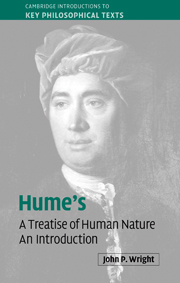Book contents
- Frontmatter
- Contents
- Preface
- Acknowledgments
- List of abbreviations
- 1 The author and the book
- 2 First principles
- 3 Causation
- 4 Skepticism
- 5 Determinism
- 6 Passions, sympathy, and other minds
- 7 Motivation: reason and calm passions
- 8 Moral sense, reason, and moral skepticism
- 9 The foundations of morals
- Bibliography and further reading
- Index
9 - The foundations of morals
Published online by Cambridge University Press: 05 June 2012
- Frontmatter
- Contents
- Preface
- Acknowledgments
- List of abbreviations
- 1 The author and the book
- 2 First principles
- 3 Causation
- 4 Skepticism
- 5 Determinism
- 6 Passions, sympathy, and other minds
- 7 Motivation: reason and calm passions
- 8 Moral sense, reason, and moral skepticism
- 9 The foundations of morals
- Bibliography and further reading
- Index
Summary
The overall problem which dominates Hume's discussion of morals in Book 3 of the Treatise is that of discovering the psychological principles which lie at the root of our moral evaluations. Like Hutcheson, he holds that these evaluations are based on feelings of pleasure and pain. We feel pleasure when we contemplate a “noble and generous action,” and pain or uneasiness when we contemplate “one that is cruel and treacherous” (T3.1.2.2: 470). Our moral evaluations are not inferred from these feelings of pleasure and pain; rather the pleasures and pains constitute our moral evaluations. At the same time, Hume follows Hutcheson in arguing that these pleasures and pains through which we judge characters and actions as moral or immoral are of a particular kind. To convince us that pleasures (and pains) come in different kinds, Hume asks us to reflect on the difference between the pleasure of a fine wine and that of a great piece of music, between that received from inanimate objects and from “the character or sentiments of any person,” and finally the difference between the pleasure received from reflecting on the qualities of someone who serves our self-interest and those of someone who is actually morally virtuous (T3.1.2.4: 472). Moral pleasures and pains are the kind we receive when we consider a character “in general, without reference to our particular interest.” Hume notes that while “the good qualities of an enemy are hurtful to us … [he] may still command our esteem and respect.”
- Type
- Chapter
- Information
- Hume's 'A Treatise of Human Nature'An Introduction, pp. 258 - 288Publisher: Cambridge University PressPrint publication year: 2009

